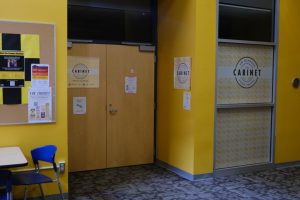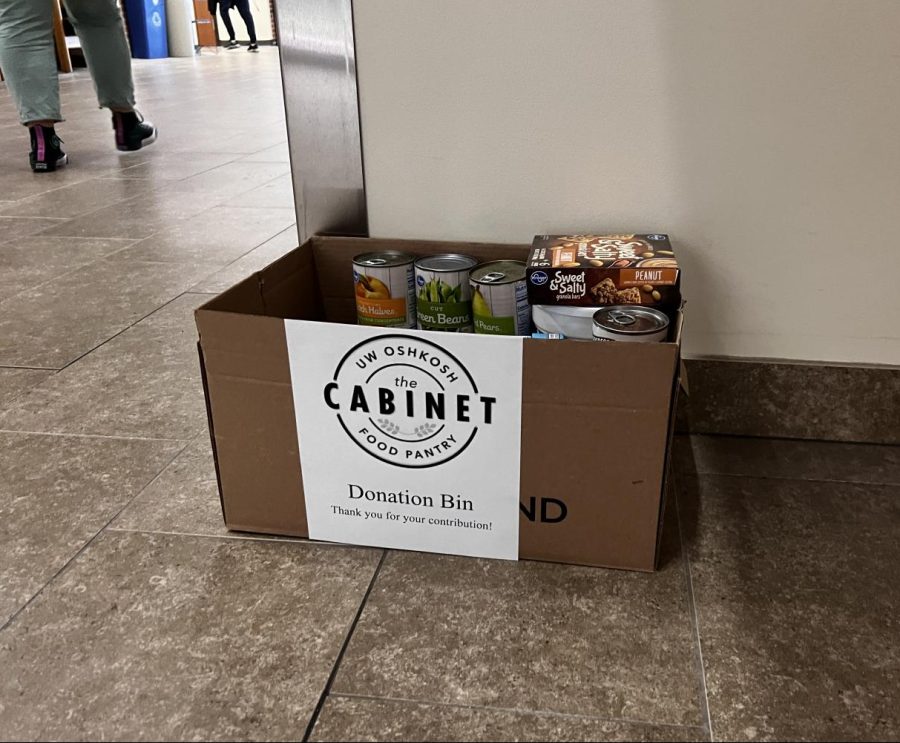OSA’s ‘The Cabinet’ lead food and hygiene drive
Liam Beran / The Advance-Titan– OSA is collecting food and hygiene products to fight food insecurity among college students.
October 26, 2022
For many people, it may seem invisible, but for those facing it, food insecurity can be a barrier towards academic and career success. The Oshkosh Student Association (OSA) and UW Oshkosh’s food pantry, The Cabinet, plan to address campus food and hygiene insecurity with a food and hygiene product drive running from Oct. 31 to Nov. 5.
The drive targets faculty members, who will be able to request donation boxes for their offices. Boxes will also be spread throughout various campus offices, according to Tyler Klaver, OSA program adviser.
“There are so many students who grew up with little to no money and they’re barely scraping by just to pay for their own studies,” said Hannah Krueger, the director of The Cabinet and a biomedical science major. “They almost come down to a decision whether they want to study or they want food or a place to live.”
The official definition of food insecurity is “a lack of consistent access to enough food to live an active and healthy life,” according to Dr. Tracy Slagter, a UWO political science professor who taught Politics of Food in Spring 2022. “Food insecurity typically means trade-offs: not buying food so that you can buy medicine; not buying food so that you can pay your rent, car payment, cell-phone bill, or books for the semester.”
Slagter made reference to the stereotypical broke, ramen-eating college student, saying “College students may think that if they’re not getting enough to eat, that’s normal. But it’s not normal. It’s dangerous.”
Krueger also said that providing hygiene products to students who can’t afford them is vitally important. “[Hygiene products] are something that everyone needs on a daily basis to stay clean and to take care of themselves,” she said. “So to be able to provide that to people who can’t afford it or have that need but can’t put their money elsewhere … it means so much that we’re able to host hygiene drives and have those products in stock.”
Both Krueger and Slagter noted that food insecurity can be difficult to perceive. Slagter said that “A person making the types of trade-offs (e.g., buying books for school instead of enough food for the week) can usually hide it pretty well. I think that’s what makes it so frightening people who need help with food typically don’t want to ask for it.”
“Although we might not see it when we walk past someone, [food insecurity] is definitely prevalent on this campus,” Krueger said.

Slagter said that communities that have faced a lack of education or affordable housing often face food insecurity. Many of those communities “have faced discrimination in housing or employment, which in turn has led to food insecurity,” she said. Food insecure households are more likely to be led by single mothers, be composed of people of color or have young children, according to Slagter.
Slagter said that pathways to address food insecurity include government and community programs. She also urged campus students and faculty to check in on each other. “I regularly tell my students that they shouldn’t be going without food if they cannot afford it. I tell them they can talk to me and I can help. So often, though, people (and especially students) don’t want to admit that they’re struggling. That’s what we’re up against,” she said.
Klaver urges students to advocate for each other. “If there are issues like food insecurity that affect campus, student leadership wants the student body to come to them,” Klaver said. OSA Assembly and Senate meetings are two venues to do so, he said. “Everything is student driven.”
The Cabinet, an OSA creation, is a source of pride for Klaver, who emphasized the collaborative efforts of students, campus administration and community and national partners like the Oshkosh Area Community Pantry and Feeding America to keep the pantry running. “I am just astounded at how well the service has been operating. We’re truly dependent on all the volunteers who step forward … I’m just really impressed with how many students each year step up.”
Krueger said that she hopes that the drive helps students feel that they are supported. “My biggest hope is that the food drive promotes a sort of community around campus and that people feel this sense of inclusivity and love around that,” she said. Krueger urged students who are facing food insecurity to utilize The Cabinet and hoped that the drive would lead more students to volunteer there.
“No matter what you’re struggling with, there are resources out there. [Students] are so cared for and I don’t want anyone to give up on their studies because of insecurities that they might suffer from,” Krueger said. “I hope everyone feels supported on this campus.”














